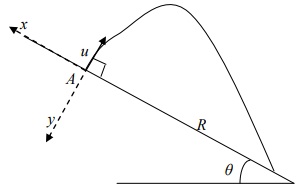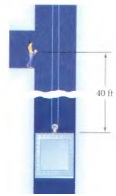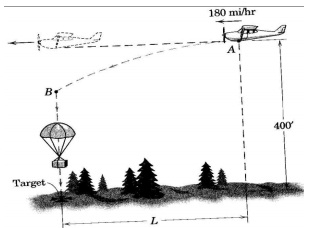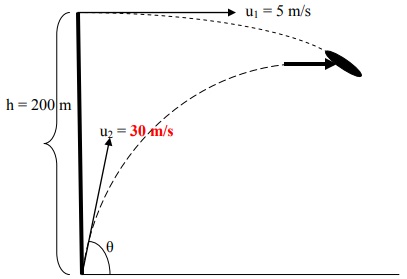Assignment:
Q1) An AMTRAK train starts from Atlanta and heads non-stop to Greensboro (distance: 350 miles). The train starts from rest and accelerates uniformly (at 0.35g) to reach its top (i.e. max) speed of 150 mph. On its way (i.e. somewhere before reaching Greensboro), the train decelerates (at -0.5g) so that it comes to a halt at the Greensboro station.
Determine the time t for the train to make the 350-mile trip. [Assume there are no delays, obstructions, etc. on the way --- hardly the reality if you have ever traveled with AMTRAK]. [g = 10 ms-2 ]
Draw the v-t, s-t, a-t graphs.

Q2) An arrow is released from point A on the hill (as shown) with an initial velocity u = 5 m/s at right angle to the slope of the hill. The hill is inclined at an angle θ=30° w.r.t horizontal. Find the range R of the arrow where it hits the ground (Assume the point of impact lies on the hill). Work only in the coordinate system as shown. Neglect any drag.
 x
x
Q3) An elevator starts from rest and moves upward, accelerating at the rate of 4 ft/s2 until it reaches a speed of 24 ft/s, which it then maintains. Two seconds after the elevator begins to move, a man standing 40 ft above the initial position of the top of the elevator throws a ball upward with an initial velocity of 64 ft/s. Determine when the ball will hit the elevator.

Q4) A small airplane flying horizontally with a speed of 180 mph at an altitude of 400 ft above a remote valley drops an emergency medical package at A. The package has a parachute which deploys at B and allows the package to descend vertically at a constant rate of 6 ft/s. If the drop is designed so that the package is to reach the ground 37 seconds after release at A, determine the horizontal lead L so that the package hits the target. Neglect air resistance.

Q5) At t = 0, a saucer is thrown horizontally as shown from a 200 m high cliff with a speed of 5 m/s. Four seconds later, an arrow is shot from the base of this cliff with a speed of 30 m/s. At what angle θ should the arrow be shot to hit the saucer? (g = 10 m/s2 ). Neglect drag.

Q6) Two ferryboats start at the same instant from opposite sides of a river, traveling across the water on routes at right angles to the shores. Each travels at a constant speed, but one is faster than the other. They pass at a point 720 yards from the nearest shore. Both boats remain in their slips for 10 minutes before starting back. On the return trips they meet 400 yards from the other shore. How wide is the river?